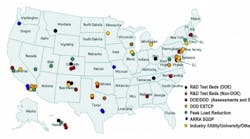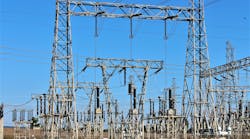The Energy Department announced more than $8 million for microgrid projects to help cities and towns better prepare for extreme weather events and other potential electricity disruptions. This investment – which includes seven awardees in Alaska, California, Illinois, Minnesota, New York, Tennessee and Washington – supports the development of advanced technologies, allowing communities across the country to become more resilient and adaptive.
“Building in grid resiliency has gained greater urgency in recent years, as demonstrated by the economic and personal losses from electricity outages due to severe weather,” said Energy Secretary Ernest Moniz. “Keeping the power on during extreme weather events and other electric grid disruptions is essential, particularly so that critical facilities such as hospitals and water treatment plants can continue operating.”
Microgrids are localized grids that are usually connected to the more traditional electric grid but can also disconnect to operate autonomously and help mitigate grid disturbances. The Energy Department supports a wide range of microgrid activities, including research and development, regional and state partnerships, and a project with the Departments of Defense and Homeland Security to demonstrate that a microgrid can maintain reliable and resilient electric power generation and distribution on military installations.
The projects will bring together communities, technology developers and providers, and utilities to develop advanced microgrid controllers and system designs for microgrids less than 10 megawatts. Each project also includes a company cost share ranging from 20 percent to about 50 percent. The seven awards include:
• ALSTOM Grid, Inc.
DOE investment approximately $1.2 million
Located in Redmond, Washington, ALSTOM Grid will research and design community microgrid systems for the Philadelphia Industrial Development Corporation and the Philadelphia Water Department, using portions of the former Philadelphia Navy Yard as a test bed.
• Burr Energy, LLC
DOE investment approximately $1.2 million
Headquartered in Little Falls, Minnesota, Burr Energy will design and build a resilient microgrid to allow the Olney, Maryland Town Center to function normally as a “lights-on” district for weeks in the event of a regional outage. A second microgrid will be designed for multi-use commercial development in nearby Prince George’s County, Maryland.
• Commonwealth Edison Company (ComEd)
DOE investment approximately $1.2 million
Headquartered in Chicago, ComEd will develop and test a commercial-grade microgrid controller capable of controlling a system of two or more interconnected microgrids. The project includes a diverse mix of facilities and critical loads, including police and fire department headquarters, major transportation infrastructure, healthcare facilities for seniors, and private residences.
• Electric Power Research Institute (EPRI)
DOE investment approximately $1.2 million
Located in Knoxville, Tennessee, EPRI will develop a commercially-viable standardized microgrid controller that can allow a community to provide continuous power for critical loads. Standardizing functionality will ensure that the controller can be easily adapted for a wide range of electric grid characteristics and allow grid operators to leverage distribution assets to support both islanded and grid-connected operation.
• General Electric Company (GE)
DOE investment approximately $1.2 million
Based in Niskayuna, New York, GE Global Research will develop an enhanced microgrid control system by adding new capabilities, such as frequency regulation. This advanced system will be used to provide resilient, high quality power to critical loads in Potsdam, New York, including emergency service providers, utilities, and other essential services, during power disruptions.
• TDX Power, Inc.
DOE investment approximately $1.2 million
Headquartered in Anchorage, Alaska, TDX will engineer, design, simulate, and build a microgrid control system on Saint Paul Island, an island located in the Bering Sea hundreds of miles from mainland Alaska. The system will incorporate a wide range of energy resources in grid-connected and islanded modes to support the island utility’s existing generation facilities, while advancing microgrid architectures and technologies to strengthen the resiliency of the electric infrastructure, lower energy costs, and reduce emissions.
• The University of California, Irvine (UCI)
DOE investment approximately $1.2million
The Advanced Power and Energy Program at UCI will develop and test a generic microgrid controller intended to be readily adapted to manage a range of microgrid systems. With the California Independent System Operator Corporation providing technical advice, this project is expected to pave the way for the development of open source industry standards.


